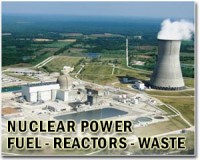 |
Singapore (AFP) April 16, 2011 It happened a quarter of a century ago but Sergei Belyakov still remembers vividly how much he suffered from high radiation exposure after the Chernobyl nuclear plant meltdown. "I was extremely weak, my motion senses were altered and I had difficulty breathing normally," said the Ukrainian-born scientist, part of a Soviet clean-up crew assigned to tackle the world's worst nuclear plant disaster. Belyakov could not even muster the strength to play his favourite sport, basketball, for more than a year after Chernobyl and says he still suffers from the lingering effects of exposure during a 40-day stint at the stricken plant. But as the world prepares to mark the 25th anniversary of the April 26, 1986 Chernobyl incident against the backdrop of an ongoing emergency at the Fukushima nuclear plant in Japan, Belyakov still believes in nuclear energy. "Despite the fact that I was deeply affected personally, I still truly believe that this is the only choice for us," he said. "We don't have any other choices because we are going to run out eventually of oil, we are going to run out of coal," he told AFP. A coin-sized patch of skin on his neck which was exposed to the air in Chernobyl has lost pigmentation, but Belyakov prefers not to talk in detail about his current health condition. "It's just too private. I can tell you this, I am seemingly physically OK but I am not," said the 55-year-old naturalised American citizen now working in Singapore for AMRI, a US chemical research firm. Japan has upgraded the Fukushima nuclear emergency to a maximum seven on an international scale of atomic crises, the first time the highest ranking has been invoked since the Chernobyl disaster. It has been struggling to bring the emergency under control since the March 11 quake-tsunami disasters crippled the Fukushima plant's cooling system. The quake and tsunami killed 13,500 people and left 14,500 unaccounted for. The way Belyakov sees it, the Chernobyl and Fukushima accidents were largely the result of human shortcomings and not problems with the technology itself. He said France, proportionately the world's biggest user of nuclear power with 75 percent of its energy needs met by atomic plants, was an example of how tight regulations can be effective in ensuring safety at such facilities. "In Chernobyl, it was a human mistake and it was a design flaw, and Fukushima had its own unfortunate chain of events plus human factors once again," said Belyakov. Japan's nuclear crisis has opened a floodgate of memories for Belyakov, who took up American citizenship after he emigrated to the United States in 1992. He was 30 and teaching chemistry at a university in what was part of the then Soviet Union when he volunteered to join thousands of other people to help clean up the Chernobyl fallout. Belyakov wrote a memoir titled "The Liquidator" in Russian based on his experience, an effort that has helped him overcome the psychological scars of his Chernobyl experience. "That's what psychologists recommend, if you need to get rid of it, you need to draw or write about it," he said. Alternatives such has hydroelectric dams, solar panels and wind turbines pale in comparison with the efficiency of nuclear energy as a substitute for the fossil fuels blamed for climate change, according to Belyakov. He was not surprised by the upgrading of the Fukushima crisis alert. "Looking at the pictures from the first day of the accident, you see the plumes of smoke coming out and you know it's serious damage to the plant," he said. "Already, I know it's not going to take weeks or months, it's going to take years to clean up."
Share This Article With Planet Earth
Related Links Nuclear Power News - Nuclear Science, Nuclear Technology Powering The World in the 21st Century at Energy-Daily.com
 Merkel: Nuclear exit 'as soon as possible'
Merkel: Nuclear exit 'as soon as possible'Berlin (UPI) Apr 15, 2011 Germany will drop nuclear power as soon as possible, Chancellor Angela Merkel said Friday, in a major policy reversal that will alter the energy mix in Europe's largest economy. The German government, backed by the governors of the 16 German states, will decide by mid-June how long the country's 17 nuclear power reactors are allowed to remain online, Merkel said. Berlin also will spell ... read more |
|
| The content herein, unless otherwise known to be public domain, are Copyright 1995-2010 - SpaceDaily. AFP and UPI Wire Stories are copyright Agence France-Presse and United Press International. ESA Portal Reports are copyright European Space Agency. All NASA sourced material is public domain. Additional copyrights may apply in whole or part to other bona fide parties. Advertising does not imply endorsement,agreement or approval of any opinions, statements or information provided by SpaceDaily on any Web page published or hosted by SpaceDaily. Privacy Statement |